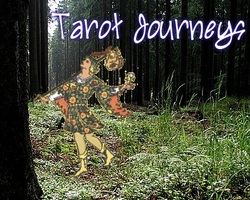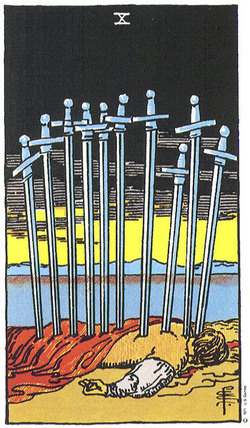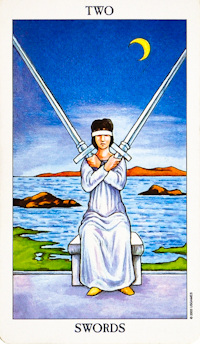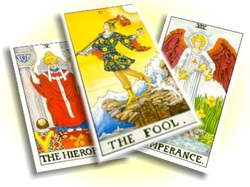 The first installment of Tarot Journeys, a jam-packed six week walk through each card of the Major Arcana, is finally here!(Like that picture? That's my oh-so-basic Photoshop skills. I feel so clever!) I am hugely excited, because not only does this fill one of my goals for Mirror Moon Tarot, becoming a teacher of Tarot and spiritual development, but it's opening up a truly unique offering to all of you. So many Tarot courses tell you how to read the cards. Which, well, that's what they're here for - right? Yes and no. Because Tarot is all about archetypes, larger-than-life story figures that teach us about ourselves and the world. It's all about symbolism, from the little dog chasing the Fool to the two pillars framing the High Priestess's temple. And it's all about micro-lessons in wisdom, spiritual development, and ways to create change in your life. I wanted to create a course that highlights all that - the things that Tarot can teach us emotionally, spiritually. And I wanted to do it in the way I love best, as an interactive journey - meditations, exercises, quotes, spreads, and lessons about how to tap into the wisdom of the cards. This is a huge, HUGE undertaking. So huge that I had to divide even the Major Arcana up into parts. This first segment, Of Mentors and Magic Wands, lets you apprentice to the first six cards of the Major Arcana - the Fool through the Heirophant - as a journey to a deeper understanding of Tarot and of yourself. Enter the Magician's garden and call the elements. Create your own daily traditions with the Heirophant. Let the Emperor show you that you, and only you, are the authority on yourself. And much, much more. Click here (or on the 'Courses' tab above) to find out more about exactly what you'll get over the full six weeks. And if you enjoy this course? The others in the series are well underway! Still not sure if this is right for you? Take a look at a preview from the opening of the course, where I show you how archetypes - and even the stories you love - can tell you a lot about who you are and what you value.
 Have you ever encountered something that just makes your eye start twitching and your fingers start drumming? The kind of thing where no matter how much you try to practice non-judgmental bliss, it can sometimes just get to you? Here are a few things I've seen in Tarot that get under my skin.
1. "Gypsy" fortune teller acts. First of all, "Gypsy" is actually a really insensitive word. A lot of people don't know this, so don't feel horrible if you used it up to now or anything. But it's a big-time slur in Europe, and it isn't even accurate, considering it was used to refer to the Romani people because they "looked Egyptian" and no one could be bothered to ask them for the facts. Kind of like "Indians" referring to Native peoples in North America.
The actual semantics aside, if you're reading Tarot more for the entertainment than the counseling angle - and that is totally fine, seriously, as long as you make it clear that's what it is - then you can probably find a sparkly costume to do it in without an accent and the words "cross my palm with silver." Come on, guys. There are like six stereotypes that plays on, and not enough people know what they really refer to.
2. "Bad" cards. People who are reading for themselves tend to do this. A reversal is "bad". The high Swords cards or the Tower are "scary". The Star in the "what to watch out for" position means "you are heretofore advised to throw yourself into a pit of despair and never be optimistic again."
You can read everything super-literally if you want, and I get it if you want the cards to just serve up a slice of truth: "No, the job probably isn't on the way. And also you should probably look out for the bolt of lightning that's going to shake your world up. Just warning you." But I feel like I'm watching a mime box himself in. The problem isn't how you're reading, when you do it this way, it's how you're responding to what it says. I honestly can't, in my heart of hearts, believe your inner guidance and a hand from the Universe is simply saying "Your life will suck right now."
Why is there going to be a bolt from the blue, or a feeling of total despair? You're never helpless in your life, and rarely does anything just happen to you, so determine what's going to show up in your world and decide how you want to feel about that. Adjust circumstances accordingly. Maybe you're not supposed to get the job because there's a better one on the way. Or the sudden, painful revelation will lead to you reinventing your world in a way you'd never have been able to before. Tarot is never just about things happening to you. It's about looking at the road you're on, where it's leading, and if you want to change direction.
3. "They're doing it wrong!" Yes, before you ask, I see the irony here. But seriously, I can't stress this enough. Yes, there are close-minded ways of catering your reading to exactly what you want to hear, or responding to your reading from a place of fear. And that's not good for your learning, or what you get out of reading Tarot. But I'm talking about the methods you pick up and the teachers you choose. There is no end-all-and-be-all as far as that's concerned. The only way you could possibly be "doing it wrong" is if you learn one way, stop there, and refuse to learn anything else. The more information you gather, the more you can decide for yourself what's worth doing and how.
But, here's the real reason for this one: even if you work for years and decide the best way to learn or teach or read the cards or whatever else, please don't be a jerk about it. I have seen a few Tarot experts and instructors call each other out, often by name. I've seen them get judge-y for having a different opinion, teachinga certain way, charging a certain amount of money. I can't think of anything that turned me off faster than watching a seminar from an instructor, and listening to them smugly outline how their teaching was superior to someone else's book.
Everyone learns differently. Everyone responds to the cards differently. Don't limit yourself by stereotypes, by fear, or by inaction. But most of all, don't ever limit someone else by telling them there's only one way to tap into the cards. Tarot is far too elaborate, magical, and full of potential for that.
I know I stress a lot about Tarot being a tool with no one right method, and how the magic is in you. Today I thought I'd put up a really great YouTube video I found by Jeanne Fiorini of TarotWorks.com, who talks about some of the traditions and superstitions behind Tarot - and how really, like I keep emphasizing, it's a set of tools meant to bring out your inner wisdom.
 When I was searching through Tarot articles for new information to share with you guys, I stumbled on something that really made me twitchy. In one article geared towards learning to read the cards for beginners, I saw an author saying it might be too confusing for a beginner to read multiple books on the cards, because it might lead to conflicting meanings.
And my first thought was: so what?
Here's the thing about Tarot meanings - they evolve, based on the reader, the deck, the author, the school of thought, the time of the writing. Saying that "conflicting ideas" will confuse you is like saying there's a right answer in the first place. But worst of all, it's like saying you can know too much.
I'm a bookworm and, showing my nerdy roots again, a Ravenclaw at heart. I can't think of anything you could possibly read too much on. You should always, always strive to learn as much as possible - or you'll get locked into one meaning, and unable to be flexible when the need serves. When you're reading for yourself or for someone else, you'll find a meaning for the cards that just doesn't fit the rest of the reading, unless you're willing to think outside the box a little bit or go with your gut. Saying that's "too confusing" is like assuming you can't think hard enough to read the cards in the first place.
There are things to watch out for, of course. Don't scatter your energies and try to tackle too many books at once without absorbing all of them. Don't take anything as gospel without examining why one author feels one way, and another might feel a different way. Don't fail to recognize real, historical facts, because Tarot's genuine evidence-based history shows a lot about where it came from and helps you appreciate how it evolved.
But there's never too much information. There are only ineffective ways of absorbing it.
 When you're first starting out while reading Tarot cards, there's a tendency to second-guess yourself. I can still remember all the things I used to say to myself in the beginning. "I haven't shuffled enough, that's why this card keeps reappearing." "There's too many reversals for this to really be accurate." "I really need to learn to shuffle better, a card just flew out from the deck mid-way through. Now I can't possibly draw it or it's a biased reading in some way." Here's the thing: in Tarot, there aren't really mistakes.I'm not saying you can't give a bad reading. And not everyone's going to agree with me - I remember Dan Pelletier's "The Process" saying that once a card flies out of a deck during shuffling, "you've lost all credibility with your sitter," and I can understand exactly why he'd say so. But I also remember The Devil practically shooting out from my hand during one shuffling. And I proceeded to lay it on the table, and ask if addiction had recently come into play for my sitter. As it turned out, her son was in prison for some of the things he'd done while on drugs. I pay attention to the cards that shoot out of my hand as additions to the reading now, and it never fails. Repeating cards? Those are a capital-M Message for you, one you need to really grasp the meaning of when they show up. They'll haunt you across multiple decks until you really figure it out. Too many reversals? Maybe see reversals in a different light for this reading - as cards that are blocked/scattered energy, or energies you need to pay attention to. Ask three Tarot readers and get five different answers. But the important thing here is that Tarot reflects what's going on in the world, and inside you, so it's a beautifully adaptable tool to whatever might happen. What's important is really your reaction, the connections you make. Your mistakes might tell you more about your question than a reading that's perfect, smooth sailing. Agree? Disagree? I'd love to hear your personal interpretation of events like these in the comments!
 Everywhere you go, it seems like there are different Tarot readers with different styles and approaches. And there's a ton of information about the cards on the Internet, with a lot of different approaches and ideas. It's a bit easy to get caught down the rabbit hole when you're getting started. Here are five of my favorite Tarot resources that I use over and over again, all of which are really great for beginners - but can also provide some new ground to cover for experts, too. Aeclectic.net - If you want to review a deck before you buy it, this is place to go. There are thousands of decks sorted by categories, types, trends, and even the top-voted decks for each year. The site also has a really big, popular forum that can be overwhelming at first, but has a ton of information on pretty much everything Tarot you can think of - and takes a look at oracle and Leormand decks, too. Facade.com - Online Tarot readings work just as well as the in-person kind, and this site offers the biggest variety of decks and spreads I know to give incredibly detailed Tarot readings. The site also provides readings for runes, I Ching, biorhythms, and more. It's easy to spend hours there! Learntarot.com - This is one of the main sites I used to learn Tarot, and it's still one of the most comprehensive sets of free beginner lessons I know. Joan Bunning provides helpful exercises, great insight, and useful sets of keywords for each card. The only problem with this and any Tarot site is it's easy to get caught up in one author's version of keywords, and not explore the full complexity of what the Tarot has to offer. Make sure you keep things diverse! Masqued Man's Tarot Bible - Sadly there isn't really a hub page for this awesome resource, so I've got to start you with his page for the Magician. But this site shows comparative images from hundreds of different Tarot decks, spread across the entire deck. It's great for looking before you buy, and also for comparing different ideas and symbols across the various decks, deepening your understanding of each card. (I have to confess, I'm not sure how copyright works for the images this site uses, or if it does. So if that worries you, by all means, don't visit. But it's out there, it's free, and I've found its resources make me a better reader - and more likely to buy a deck because I know I'm going to love it.) Tarotguild.com - The Tarot Guild is the best site for Tarot professionals I know. It has tons of great podcasts, classes, and resources for both students who want to learn, and professional readers who want a boost in their businesses. There are classes exclusively on social media, which is a huge part of online Tarot these days, and there's an Endorsed Readers Program where you can work for the guild in providing readings for pay. It's taught me so much in the time I've been a member, and while there's a fee for membership, it's very reasonable. And the podcasts are all free! Sorry I'm not really tackling individual readers here, but I wanted to keep this as more of a learning resource. What are some of your favorite Tarot sites out there? And yes, you're free to link to your own!
|





 RSS Feed
RSS Feed

